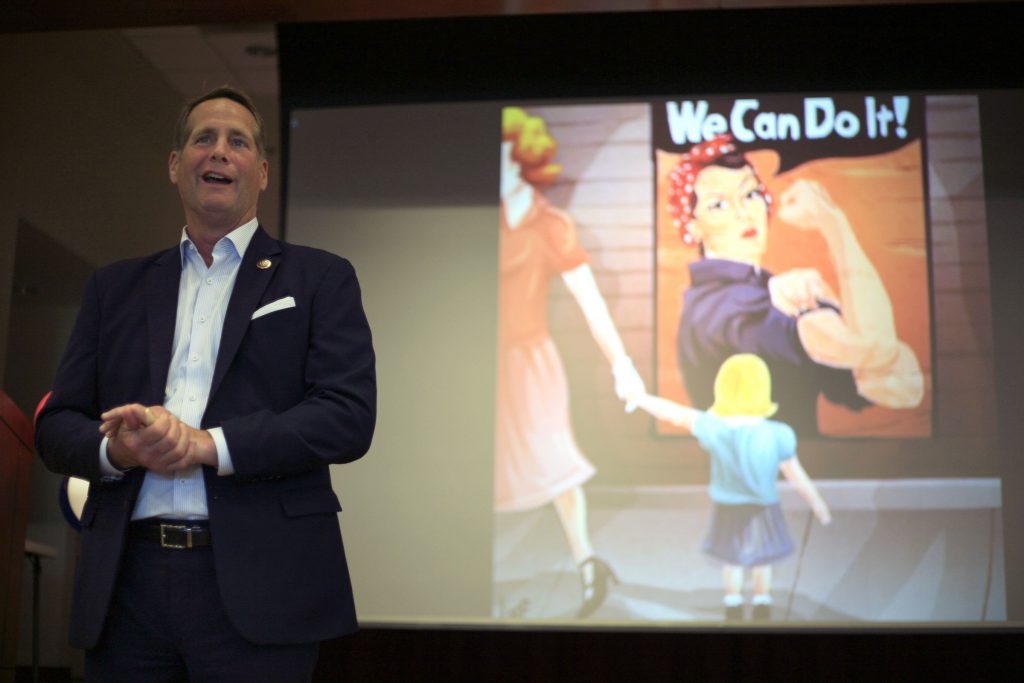
— Photo by Sara Hall ©
Airport issues, environmental policies, and voting centers were just a few of the hot topics two newly elected representatives tackled during a forum this week.
Congressman Harley Rouda and Assemblywoman Cottie Petrie-Norris, both newly elected Democrats from Laguna Beach, represent Newport Beach in District 48 and District 74, respectively. The duo were the featured speakers at the Newport Beach Women’s Democratic Club meeting on Monday.
About 150 people packed into the Evelyn Hart Event Center at OASIS Senior Center in Corona del Mar to hear the pair of representatives speak and answer questions from the audience.
Kicking off the discussion, Rouda noted that he has introduced more legislation than any other freshman office on capitol hill.
“Not that I’m competitive,” Rouda joked, “but [Dana] Rohrabacher passed three bills in 30 years, I passed three bills in my first year.”
He’s also introduced 28 measures, helped pass 16 measures, and signed on to co-sponsor 279 measures.
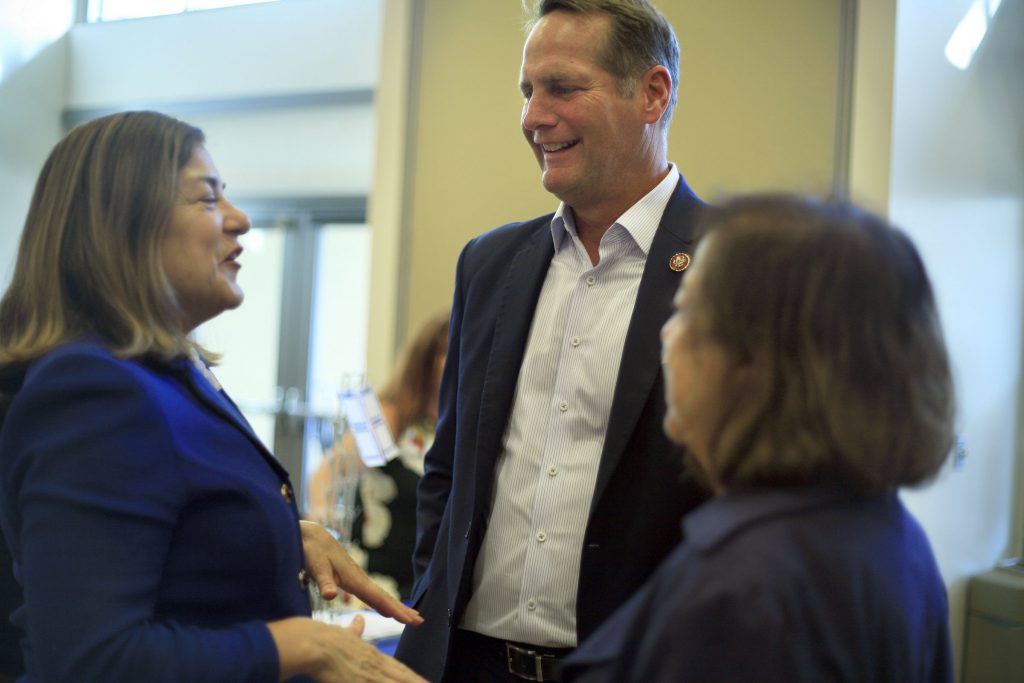
— Photo by Sara Hall ©
“We are fighting really hard to do exactly what we said when we campaigned,” Rouda noted.
The impact of John Wayne Airport is often identified as a top concern in Newport Beach, and one Rouda mentioned on the campaign trail.
During the Q&A period, Susan Dvorak, from community group Citizens Against Airport Noise & Pollution, questioned Rouda about issues related to JWA.
His answer focused on the Federal Aviation Administration’s recent Next Generation Air Transportation System; a modernization program being implemented at airports across the country. It incorporates less fanning and more narrowing, precise and repeatable flight paths, which has had some negative impacts on Newport Beach.
“NextGen… sounded good in theory, but ended up not being (so good),” Rouda said.
Consolidated flight patterns, reducing fuel costs and improving safety, are all ideas that make sense, he pointed out. However, the previous approach of fanning the flight paths ensured that the burden was spread out.
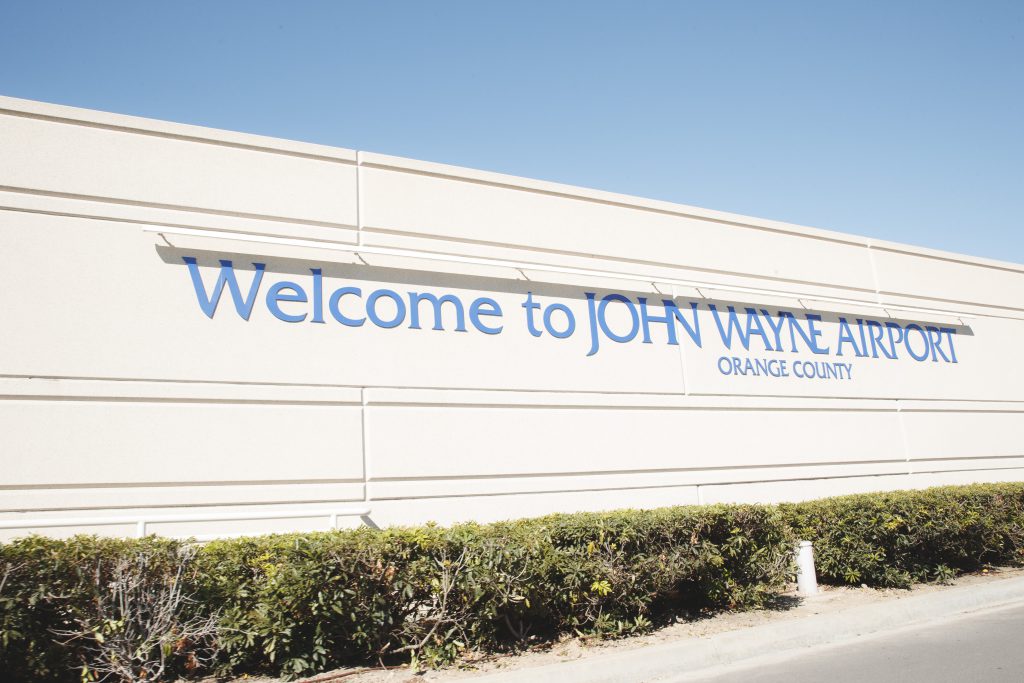
— Photo courtesy JWA/ JD Renes
“Now, these specific communities are just hammered over and over with undue noise and air pollution,” Rouda said.
The aim is to work with the community and local officials to get the FAA to address the issue, Rouda noted.
He explained his understanding (which he admitted may be wrong, “like most politicians,” he joked) of the method used at John Wayne Airport to determine whether the sound ordinance was violated.
The measurement is not based on levels recorded per flight, he said, it’s based on all flights over a 30-day period. The average of all flights over that time period must stay under the official threshold, he explained. That means half of the flights could be over and half could be under, but as long as the overall average is equal to or less than that threshold, there is no penalty.
“I think that’s absolutely wrong,” Rouda said. “Every single flight that goes over the threshold should be fined. And that way you’ll get the behavior you want in a hurry.”
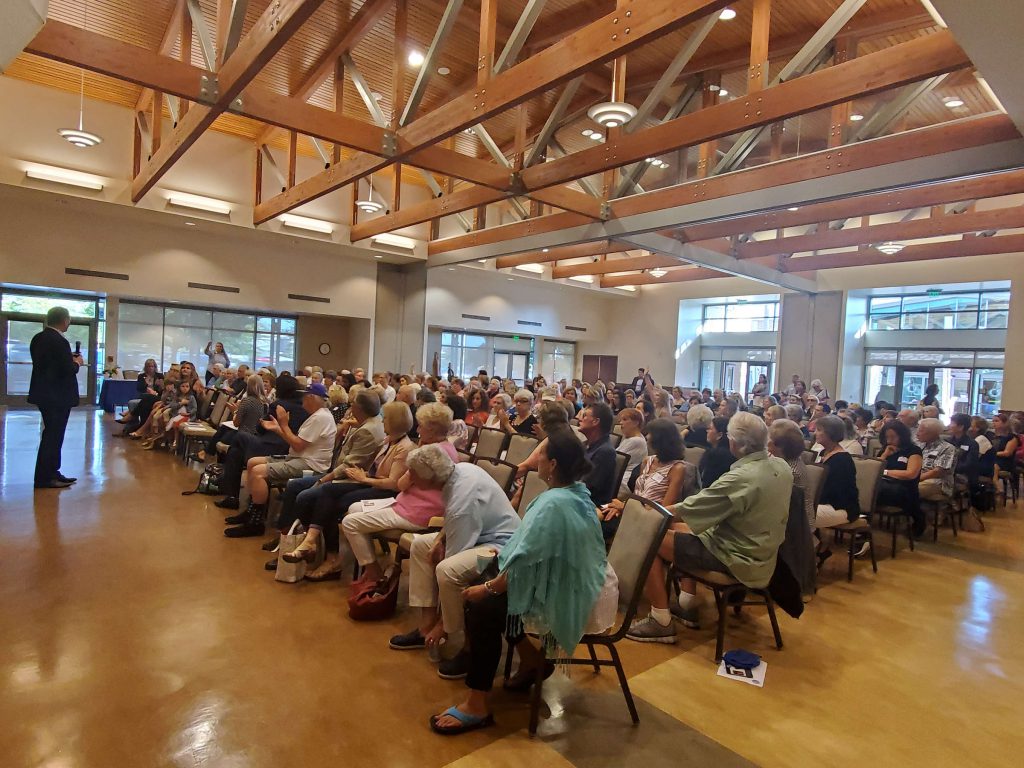
— Photo by Sara Hall ©
Rouda also shared some insider anecdotes.
Riding in the elevator with fellow Oversight Committee member, Congressman Justin Amash, a former Republican (declared Independent in July) from Grand Rapids, Mich., Rouda asked him if he was “going to do the right thing” regarding the Mueller report.
“He said he can’t do it, politically. And then the doors opened and he got off the elevator,” Rouda said simply.
That has been the most disheartening part of being in D.C., he noted.
“Since when does our oath to the constitution, the interpretation, is determined by who’s in office, which ways the political winds are blowing, or what (the party) tells you you should do,” Rouda said. “That’s been the biggest disappointment, seeing that type of lack of commitment, lack of will, lack of spine to do the right thing.”
On the flip side, a highlight: Coming home late at night, seeing the Capitol, and knowing that he is one of about 12,000 to have ever served in the house of the people.
“It is very humbling,” he commented.
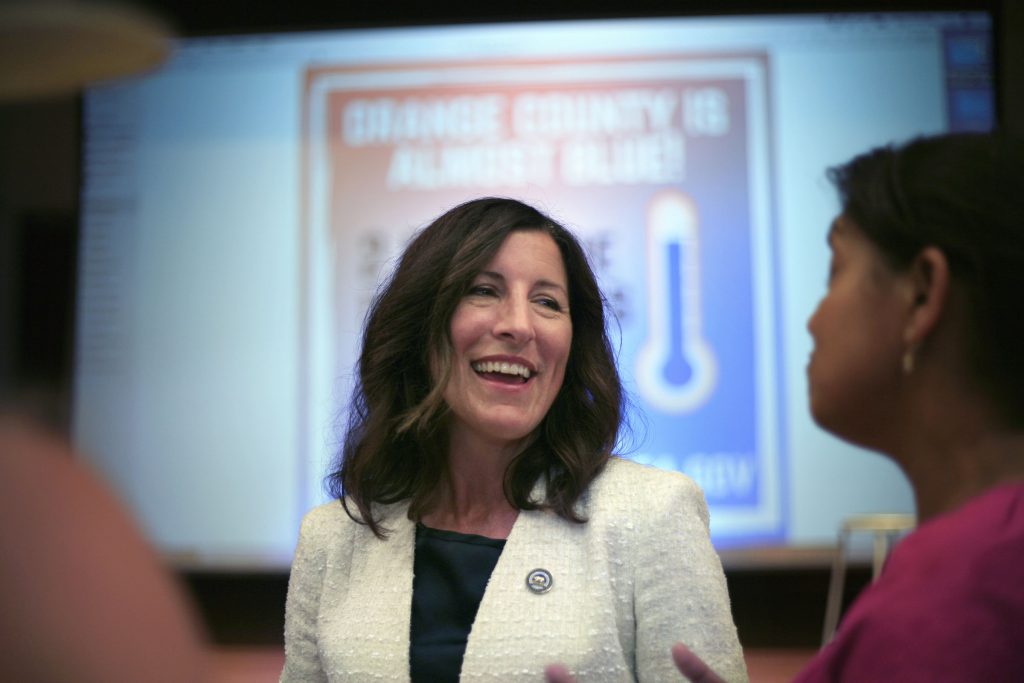
— Photo by Sara Hall ©
Petrie-Norris also emphasized how grateful she is to be in the position.
“It’s an absolute honor and privilege to represent you and to represent this community in the California state assembly,” Petrie-Norris said. “It’s a pretty extraordinary job.”
She’s been hard at work the last seven months. A few of her areas of focus include protecting the coastline, funding public education, expand healthcare access across the state, creating jobs now and for the future.
“I really felt for so long, for decades, Orange County did not have a voice in Sacramento, we didn’t have a seat at the table,” Petrie-Norris said. “We weren’t getting our fair share of the state’s resources invested back into our communities.”
As part of the 2019-20 budget, that’s going to change, she added.
Included in a list of nine local projects and programs she secured funding for is $2.9 million to help end veteran homelessness in the county by partnering with OC United Way, another $2.9 million for the final phase of the Crystal Cove cottages restoration project, and $500,000 for Newport Beach Sculpture Exhibition in Civic Center Park and arts education, and $4.5 million for the OC Fire Authority for an intelligence, reconnaissance, and surveillance pilot program that will deploy military-grade technology to fire prevention and response.
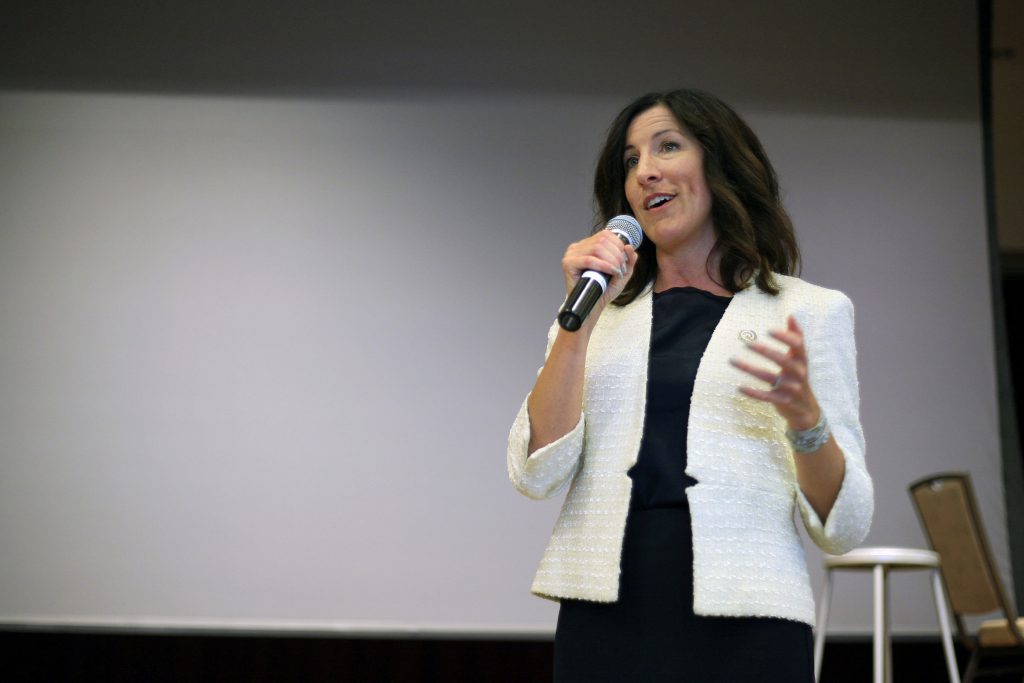
— Photo by Sara Hall ©
“It’s so gratifying to be able to work on issues that matter to this community and to be able to get things done,” Petrie-Norris said.
Environmental policy is an issue near the top of her priority list. She introduced legislation (AB 933) that will establish the Ecosystem Resilience Program within the Department of Conservation to provide funding for watershed coordinators to develop and implement watershed improvement plans. The bill passed the Senate Natural Resources and Water Committee on July 9, with a 7-1 vote.
“That’s focused on strengthening our management of California’s precious wetlands,” Petrie-Norris said.
She also introduced a bill (AB 65) that will invest in natural infrastructure along the coast in an effort to combat sea level rise. The Assembly Natural Resources Committee voted 11-0 in support of the legislation on March 25.
“It’s a huge, huge priority for our community,” Petrie-Norris noted.
She’s also been working on expanding healthcare access, including access to birth control, healthcare access for low-income seniors and low-income pregnant women.
“It’s been a busy seven months of legislating,” Petrie-Norris said.
During the Q&A period, a resident asked about the new voting system in Orange County, which eliminates precinct voting and establishes voting centers.
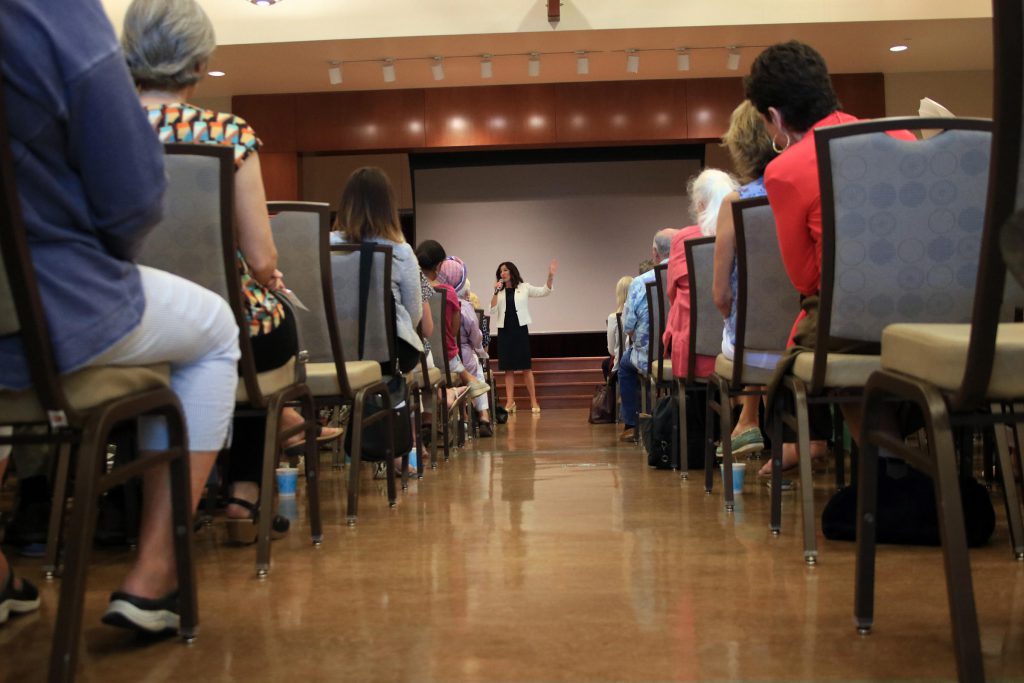
— Photo by Sara Hall ©
“The changes that are happening in Orange County for voting are potentially really, really exciting,” Petrie-Norris said.
The model OC is adopting has a few major changes: Voting centers will be open 10 days prior to the election; residents can vote at any voting center in the county; and everyone will receive mail-in ballots.
“The goal is to make it as easy as possible to get people engaged in our democracy and get people voting,” Petrie-Norris said. “It makes it more accessible for people.”
The challenge will be alerting residents that traditional polling places are going to be phased out.
“That potentially could be confusing if it’s not properly communicated and messaged, you could actually see a big downturn in voting,” she added.
It’s important to get the word out that this change is coming. If it’s managed properly it should increase turnout, she noted.
Rouda also answered questions about impeachment, working with the senate, voting centers, Mueller report, national debt, and more.
Petrie-Norris also answered questions about sober living homes, the stalled SB 50 that addresses with the housing crisis, homelessness, and more.
For more information, visit nbwdc.org, rouda.house.gov, and a74.asmdc.org.




